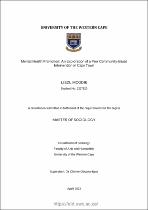| dc.contributor.advisor | Obuaku-Igwe, Chinwe | |
| dc.contributor.author | Moodie, Liezl | |
| dc.date.accessioned | 2023-08-02T12:41:56Z | |
| dc.date.available | 2023-08-02T12:41:56Z | |
| dc.date.issued | 2023 | |
| dc.identifier.uri | http://hdl.handle.net/11394/10431 | |
| dc.description | Masters of Art | en_US |
| dc.description.abstract | The outbreak of COVID-19 in 2019 and the accompanying lockdown, social distancing and quarantine measures across the world separated individuals and families from their loved ones. This separation and social isolation also resulted in loss of jobs due to the closure of the hospitality industry and other sectors. It also caused loneliness and anxiety disorders in individuals with pre-existing vulnerabilities. The government of South Africa provided safety nets and social protection in the form of grants to vulnerable groups. Despite these interventions, most individuals who had suffered the worst impact of COVID-19 lockdown on their emotional wellbeing seemed to have been left without adequate access to treatments and coping resources. | en_US |
| dc.language.iso | en | en_US |
| dc.publisher | University of the Western Cape | en_US |
| dc.subject | Mental health management | en_US |
| dc.subject | Covid-19 | en_US |
| dc.subject | Public health | en_US |
| dc.subject | South Africa | en_US |
| dc.subject | Wellness | en_US |
| dc.subject | Humanities | en_US |
| dc.title | Mental health promotion: An exploration of a peer community-based intervention in Cape Town | en_US |
| dc.rights.holder | University of the Western Cape | en_US |

